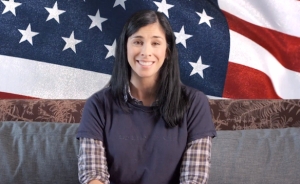Last week I wrote a piece called “Onset,” in which I described the way I first became clinically depressed about nine years ago. That was the first time I’d ever written about that or told anyone other than a few close friends, so the many positive responses I got were really encouraging. One commenter responded and asked a bunch of questions. My answers turned out to be really lengthy and interesting to write, so I thought I’d share the comment and the response here.
“Miriam, I read this post on Sunday and cannot stop thinking about it. I have never felt depression personally and cannot truly relate, but I have a young daughter and so your experience had a profound impact on me. Thank you so much for sharing.
“Do you think that one can be predisposed to having depression and thus be more vulnerable to the comments of others? Do you think that your mother could have predicted the impact her words would have on you? Could she have done something following that discussion to minimize the impact and alleviate the burden you felt? What do you think parents can do to help a child build his or her self-worth and confidence?
“I really hope you do not mind my asking all these questions. Your insight would be much appreciated.”
And here’s what I said:
Hey there,
Thanks for reading and don’t worry, I don’t mind the questions. I’ll try to answer them one at a time:
Do you think that one can be predisposed to having depression and thus be more vulnerable to the comments of others?
Yes, absolutely. Research in the field is rapidly coming to this conclusion. Depression is partially genetic, and researchers have started identifying certain genes that may be involved. One particular genetic variation, for instance, has no effect in the absence of significant life stressors, but if youdo have them, your risk for depression suddenly shoots up relative to people without the genetic variation who are experiencing comparable stressors. A phenomenon like this is called a gene-environment interaction, and such phenomena are at the forefront of research in the field right now.
Aside from that, there are other ways to be predisposed to or at risk for depression. Being poor. Being queer. Being female (although this is arguable, because research suggests that men simply underreport/do not recognize their depression). Being a college student. Having other mental illnesses, including substance abuse.
Furthermore, people who don’t learn good coping skills are more likely to respond to stress with depression and anxiety. I was one such person.
If you’d like more information about this and/or links to specific research, let me know!
Do you think that your mother could have predicted the impact her words would have on you?
No, I don’t think so. Although her mind is similar to mine in many ways, in this case, she probably either thought that I wouldn’t take her seriously, or else that her comment would light a fire under my ass, so to speak, and motivate me to do better in school without actually making me extremely anxious and depressed. Furthermore, my mother was also always very anxious about school when she was young, and she seems to think that that’s “just how things are.” As in, it’s unavoidable anyway, we just have to suffer through it, and so on. And that segues right into your next question:
Could she have done something following that discussion to minimize the impact and alleviate the burden you felt?
She could’ve, but I don’t think she knew/thought anything was out of the ordinary. I must’ve looked a lot like her own teenage self, to her. Had I had the communication skills of an adult, I could’ve said something like, “It would be really helpful to me if you don’t talk to me about my grades and trust that I’m doing my best,” or “It really scared me when you said that I’d have to quit the Nutcracker and I think it was unfair of you to say that.” But I was 12. I didn’t learn how to talk this way for another 8 years.
If she realized that something was wrong, she could’ve taken me to see a counselor, reminded me that she will love and value me regardless of my grades, told me that my grades are not the measure of my entire worth as a person, and so on. But given the situation, I’m not sure that she could’ve known to do that.
What do you think parents can do to help a child build his or her self-worth and confidence?
Good question. Lots of things! While it’s important for children to do well in school, school also isn’t all there is. What would’ve happened to me if I’d failed to get straight A’s? I wouldn’t have gone to Northwestern, probably. So I would’ve gone to an awesome liberal arts college or a good state school instead. No big deal. My parents didn’t realize that this was an acceptable path, though, so they really emphasized the damn grades.
Also, research generally shows that the best way to build confidence and self-esteem in kids isn’t to steadfastly insist that they “think positively” and “have good self-esteem” and all the other things that are done by schools and parents now. The best way is to let them do the things they love, get better and better at them, and feel secure in the knowledge that they have things to do that they love and are good at. Another good way is to teach them that their worth lies not in their performance on arbitrary culturally-sanctioned tasks like school and sports, but in their ability to be good people, in their willingness to work hard and try things, in their curiosity and their urge to ask good questions, and so on.
Of course, you have a limited ability to control what messages your children receive from the world outside of your family (although you can help by choosing which neighborhood to live in, which schools to send them to, which after-school activities to encourage them to do, etc.). However, which messages you send them yourself matters a lot. At the dinner table, do you ask them what grades they got on their homework, or what they learned that day? When they tell you about making new friends, do you ask which neighborhood the friends live in and what their parents do for a living, or what it is about them that makes them interesting to hang out with? When you’re shopping for clothes with your daughter, do you tell her to put that dress back because it doesn’t “flatter her figure,” or do you let her choose clothes that she feels comfortable in? When a boyfriend breaks up with her, do you reassure her that she’ll meet someone who likes her as she is, or do you tell her that she should’ve been thinner/happier/better-dressed?
These things matter.
Please take everything I’m saying with a grain of salt. I’m very young (21) and not a parent. However, I’ve been through a lot and I’ve thought these things through a lot. What I’m telling you are the things that I wasn’t taught as a child, and that I’m now trying to teach myself by slowly and painfully rewriting my thought patterns. Had I learned them as a child, when learning is so much easier, I think things would’ve gone very differently.
I hope this helps. Thanks for taking the time to ask and to wonder how you can be a better parent.




